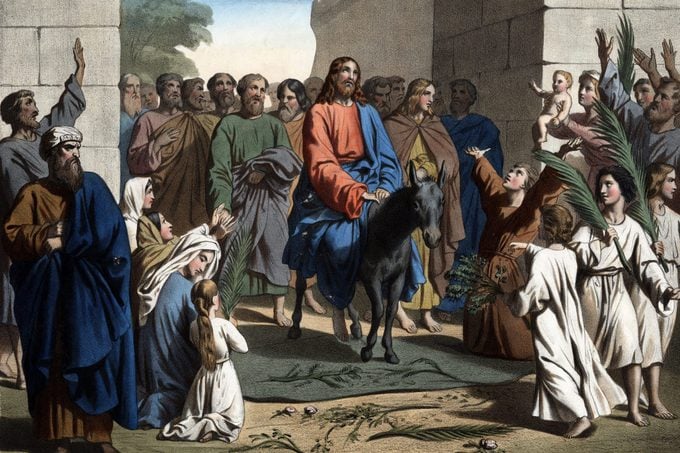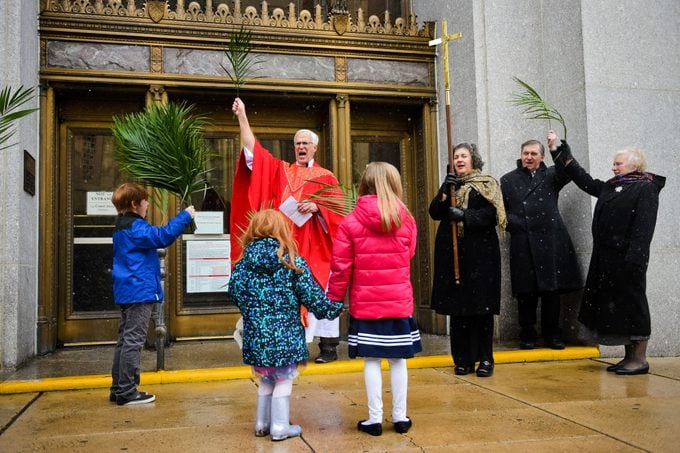When Is Palm Sunday, and Why Do We Celebrate It?
Updated: Apr. 20, 2024

Easter may get all the attention, but this related holiday is also important. Here’s everything you need to know, including when Palm Sunday falls in 2024.
Colored eggs, overflowing baskets and adorable bunnies tend to steal the spotlight on Easter. But the real focus for Christians, of course, is the big day itself and the entire week leading up to it. Palm Sunday kicks off the aptly named Holy Week, which also includes Good Friday and Holy Saturday. When is Palm Sunday, exactly? It’s always one week before Easter. And while it may fly a bit under the radar in terms of celebrations, if you don’t know much about it, you’re missing a big piece of the Easter puzzle.
“Personally, I think that Palm Sunday might be one of the most important days in the liturgical calendar,” says Anne Halloin, a historical theologian who graduated from the Harvard Divinity School. “This day reminds us of the radical vision for hope and peace that Jesus had. Few people are willing to die for a peaceful cause—even fewer would inspire a movement that would change the world. That, of all things, deserves to be celebrated.”
So why is Palm Sunday such a big deal, and why is peace so central to it? Read on to learn about this holiday’s origins, when it is this year and how Christians observe it.
Get Reader’s Digest’s Read Up newsletter for more holiday, cleaning, humor, travel, tech and fun facts all week long.
About the expert
|
When is Palm Sunday in 2024?
The date of Palm Sunday depends on the date of Easter—and that changes every year. Easter is always on the first Sunday after the Paschal full moon, or the first full moon after the spring equinox. Palm Sunday will always be one week before that.
In 2024, Palm Sunday falls on March 24. Future Palm Sundays will be on:
- April 13, 2025
- March 29, 2026
- March 21, 2027
- April 9, 2028
- March 25, 2029
What is Palm Sunday?

Palm Sunday is a religious holiday celebrated by most Christian denominations, and as noted earlier, it falls exactly one week before Easter. The name “Palm Sunday” comes from the description of Jesus Christ’s triumphal entry into Jerusalem, shortly before he was crucified the following Friday and resurrected three days later. Descriptions of the event are included in the four main gospels in the Bible: Matthew, Mark, Luke and John.
As John, one of Christ’s apostles, describes it in the Bible, Christ rode into Jerusalem on a donkey, and when he entered the city, a crowd formed around him. Then, “they took palm branches and went out to meet him, shouting, ‘Hosanna!’ ‘Blessed is he who comes in the name of the Lord!’ and ‘Blessed is the king of Israel!'” They waved the palm branches and laid them on the path in front of him while shouting these praises as a sign of devotion and honor. The people saw this as a fulfillment of a nearly 600-year-old Jewish prophecy from Zedekiah.
Today, Palm Sunday not only commemorates the moment when Jesus was recognized as the messiah, but it also symbolizes peace, hope and looking forward to the day he will return again. It’s a day of contemplation and celebration to start off the solemnity of the Holy Week, and the highlight is usually a Palm Sunday service during which parishioners are given palm branches.
According to Halloin, Palm Sunday is particularly meaningful in our chaotic world, because it’s a reminder that the Kingdom of Heaven might actually exist—offering hope at a time when peace can be hard to find. “It is that triumph and true celebration that ushers in the Easter season,” she explains. “On Palm Sunday, it appears as though this peaceful vision for the world might win.”
The history of Palm Sunday
This day of peace has a rather violent origin story. The very first Palm Sunday, when Jesus rode into Jerusalem, “was an open challenge to the Roman Empire,” Halloin says. At that time, a “triumphal procession” was the highest honor that a Roman general could achieve, as a reward for winning a military campaign in foreign lands. These parades would be elaborate displays featuring their spoils of war—including wealth, exotic treasures and, often, enslaved people. “So when Jesus of Nazareth gathered his disciples to enter Jerusalem on Palm Sunday, not only did he know this honored tradition among the Roman elite—he openly mocked it,” Halloin says. “All watched as the people of Jerusalem hailed this humble prophet as if he were a conquering general.”
Even though the original Palm Sunday events happened around AD 33, people didn’t really start celebrating it as its own day until a few centuries later. One of the first celebrations was recorded by a Spanish woman named Egeria in the 4th century. She wrote about her experiences going on a pilgrimage to the Holy Land, which included retracing Christ’s steps to Jerusalem and meeting with other Christians on the Mount of Olives to pray on Palm Sunday. But the religious ceremony as most modern Christians would recognize it didn’t start until around the 8th century.
Palm Sunday may also have some roots in pagan traditions. For instance, ancient Egyptians carried palm branches in funeral processions to represent eternal life. Similarly, in Greco-Roman culture, people used palm branches to symbolize triumph, victory and peace.
Palm Sunday traditions

While Palm Sunday is celebrated differently around the world, it always centers on welcoming Jesus into followers’ hearts and homes. Here are some common traditions you may encounter on this holiday.
Palm Sunday church services
The foundation of most Palm Sunday celebrations is attending a church service. You’ll sing hymns, hear sermons and listen to a reading of the gospel accounts of the events of the original Palm Sunday.
Receiving palms
Churches often hand out palm branches as part of their Palm Sunday services, but each church has its own customs surrounding this practice. Generally, the palms are blessed by a priest before being given to parishioners. If not handed out, they may be found at the altar or another designated location of the church. Some churches hand them out only to children.
Palm processionals
It’s less common now, but some churches still offer a processional where people walk while holding the palm branches, waving them and shouting or singing hosannas, in reference to Christ’s original entrance into Jerusalem. It may also include a reenactment of Christ’s entry, including a donkey (or a portrayal of one).
Palm crafts
Some Christians weave the fronds of the palm branches into small crosses or make them into crowns, rings or even elaborate sculptures and shapes. In places where real palm fronds aren’t available, worshipers sometimes get creative by making Easter crafts, using the branches of other trees (pussy willows are a favorite!), plants local to the area, or paper, wire, ribbons and whatever else they can find.
Decorating with palms
If you choose to take the palm branch or frond home with you, you can use it as a decoration—a visual reminder of Christ’s suffering and atonement. Hang it on a door, add it to a crucifix, put it in a journal or Bible, place it in a vase or store it in a special keepsake box.
Palm Sunday feasts
Family gatherings are a highlight of Palm Sunday celebrations, with loved ones gathering to share a meal. But what should you—and can you—eat on Palm Sunday? Those who observe Lent avoid meat during Holy Week, but most Christian traditions agree that you only need abstain from eating meat on Ash Wednesday and Fridays during Lent. So for Palm Sunday feasts, like Easter feasts, meat is often a staple, especially lamb or ham. Fig dishes are also very popular, due to figs’ association with Jesus in the Bible.
How do you dispose of palms?
Nope, you can’t just toss them in the trash! Once blessed, the palm branches are considered a “sacramental” or holy item, and they should not be thrown in the garbage. Many churches allow palm fronds to be returned to the priest after the service, who then burns them and uses the ashes for Ash Wednesday the following year. Otherwise, you should return your palm to nature by either burying it or burning it when you’re done with it.
Sources:
- Anne Halloin, MTS, historical theologian; email interview, Jan. 30, 2024
- Catholic Culture: “History of Palm Sunday”
- Almanac: “Palm Sunday”
- Blessed Is She: “Ideas for Displaying Palm Sunday Palms Around Your Home”
- Vatican City: “Directory on Popular Piety and the Liturgy: Principles and Guidelines”























